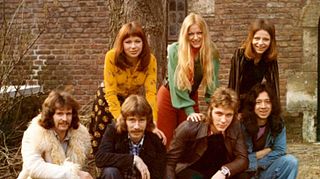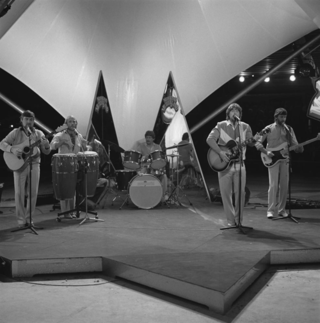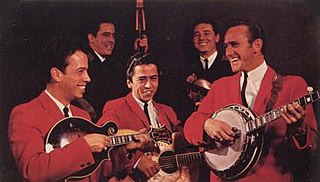The Netherlands has multiple musical traditions. Contemporary Dutch popular music is heavily influenced by music styles that emerged in the 1950s, in the United Kingdom and United States. The style is sung in both Dutch and English. Some of the latter exponents, such as Golden Earring and Shocking Blue, have attained worldwide fame.
Diesel is a Dutch pop/rock group that became one of the relatively few Dutch acts to chart in the U.S. when their song "Sausalito Summernight" entered the U.S. Top 40 in 1981.

"Good Golly, Miss Molly" is a rock 'n' roll song first recorded in 1956 by American musician Little Richard and released in January 1958 as Specialty single 624, and later on Little Richard in July 1958. The song, a jump blues, was written by John Marascalco and producer Robert "Bumps" Blackwell. Although it was first recorded by Little Richard, Blackwell produced another version by the Valiants, who imitated the fast first version recorded by Little Richard, not released at that time. Although the Valiants' version was released first, Little Richard had the hit, reaching No. 4. Like all his early hits, it quickly became a rock 'n' roll standard and has subsequently been recorded by hundreds of artists. The song is ranked No. 92 on the Rolling Stone magazine's list of the 500 Greatest Songs of All Time.

Pussycat was a Dutch country and pop group led by the three Veldpaus sisters: Toni, Betty (1952–2024), and Marianne. Other members of the band were guitarists Lou Willé, Theo Wetzels, Theo Coumans, and John Theunissen. Their song "Mississippi" was a number one hit in most European countries, including the UK, in 1975/6.
Indonesian rock is rock music from Indonesia, a product of the culture and globalizing outlook of the country, similar to this genre's music globally. Indonesian-specific ideas about individualism, interdependency, modernism, and the supernatural have also been observed in the rock videos and music of the nation.

The Cats were a Dutch rock band formed in Volendam in 1964.

Indorock is a musical genre that originated in the 1950s in the Netherlands, formerly the colonial exploiter of the Dutch East Indies. It is a fusion of Indonesian and Western music, with roots in Kroncong. The genre was performed by Indo community in the Netherlands. Indorock is one of the earliest forms of "Eurorock". Its influence on Dutch popular music was considerable. The term Indorock was used in 1981 to refer to the genre and period retrospectively.
Nederbeat is a genre of rock music that began with the Dutch rock boom in the mid-1960s influenced by British beat groups and rock bands such as the Beatles and the Rolling Stones. Much like British freakbeat, it is essentially the Dutch counterpart to American garage rock. Among the best-known Nederbeat groups are the Golden Earring, The Motions, The Outsiders and Shocking Blue.

The Kentucky Colonels were a bluegrass band that was popular during the American folk music revival of the early 1960s. Formed in Burbank, California in 1954, the group released two albums, The New Sound of Bluegrass America (1963) and Appalachian Swing! (1964). The band featured the influential bluegrass guitarist Clarence White, who was largely responsible for making the acoustic guitar a lead instrument within bluegrass, and who later went on to join the Los Angeles rock band the Byrds. The Kentucky Colonels disbanded in late 1965, with two short-lived reunions taking place in 1966 and 1973.

Earth and Fire were a Dutch rock and pop band. Formed in the Netherlands by twin brothers Chris and Gerard Koerts, and most popular in 1970, after adding a female singer, turning frontwoman, Jerney Kaagman.

Johanna Louise "Anneke" Grönloh was a Dutch singer. She had a successful career starting in 1959 that lasted throughout the 1960s, and scored a hit with "Brandend Zand", one of the best-selling Dutch songs of all time.
Dutch rock is a form of rock music produced in the Netherlands, primarily in the English language as well as in Dutch.

Andy Tielman was an influential Indo (Eurasian) artist, recognised as the "godfather" of Indorock, the style of rock and roll played by Indo artists in the 1950s and 1960s. He is considered one of the most important figures in Dutch popular music, and "defied the notion that early rock and roll was a phenomenon of white and black musicians from America".

The Bintangs are a Dutch rhythm and blues band. Founded in 1961 in Beverwijk as an indorock band, they soon began playing a rougher, rhythm and blues-inflected style. The band had a four-year hiatus in the 1980s but reunited and are still active. The band has gone through many members, with Frank Kraaijeveld as a constant element. They scored one hit, in 1970, and though commercial success has eluded them nationally and internationally they remain a popular live act.
Rudi Wairata aka Rudy Wairata(1929/1930 –1981) was an influential Indonesian musician who had fronted the Mena Moeria Minstrels and the Amboina Serenaders. Wairata's style of playing was influenced by Sol Hoʻopiʻi and Andy Iona. Along with George de Fretes he was a prominent musician in the genre of Hawaiian steel guitar music. His song "Rock'n Roll Breezes" may be the first Indo-rock song.
George de Fretes (1921-1981) was a musician from Indonesia who found fame in the Netherlands. Like his fellow countrymen Ming Luhulima and Rudi Wairata, he found sizable popularity in the Netherlands and Europe playing Hawaiian music.
Wanda de Fretes is a singer and recording artist who was popular in the Netherlands in the 1960s. She is also the daughter of legendary Moluccan steel guitarist George de Fretes and singer Joyce Aubrey. In addition to her solo efforts, she also recorded with her mother as the duo Wanda & Joyce. Besides singing pop and rock'n roll, she also sang traditional Indonesian and Malayan songs.
Joyce Aubrey was a singer and recording artist who was popular in the Netherlands in the 1960s as part of the duo Wanda & Joyce. She is also the mother of singer Wanda de Fretes as well as the ex-wife of legendary steel guitarist George de Fretes. In addition to her solo efforts, she also recorded with George de Fretes and the Amboina Serenaders, a popular Netherlands based band whose members included Ming Luhulima and Rudi Wairata. Some of their songs did well in Germany as well.
Electric Johnny & his Skyrockets were a Dutch instrumental rock band from Rotterdam. The group was formed in 1958 by Jan "Johnny" Schouten with his brothers and became part of the Netherlands' indorock scene of the 1960s.









